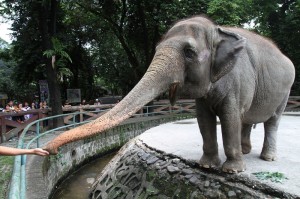MANILA, Philippines—The recommendations of an elephant expert sent by Thailand to examine Mali, Manila Zoo’s resident elephant, will weigh heavily on the government’s decision whether to keep her or ship her to a sanctuary abroad, an environment official said.
Director Theresa Mundita Lim of the Protected Areas and Wildlife Bureau (PAWB) said her agency, along with the Bureau of Animal Industry, would study carefully the findings of Dr. Nikorn Thongtip of the Kasetsart University’s Department of Large Animal and Wildlife Clinical Sciences.
The two agencies will submit a report to the Office of the President on what to do with Mali following a clamor from animal rights groups to have her transferred to a sanctuary on grounds of her purported poor health and apparent loneliness.
Lim said what was clear from Thongtip’s report was that the management of Manila Zoo had not been remiss in taking care of the animal.
“She was being looked after. But she is not fit enough to transport,” she said, adding that Mali, as per Thongtip’s recommendations, would have to lose weight and be checked for tuberculosis, among other things.
“Simply put, at this point in time, it’s going to take a long process,” Lim said of the prospects of Mali spending her remaining years abroad.
Mali was brought to the Philippines from Sri Lanka in 1977 as a gift to then First Lady Imelda Marcos. She was 3 years old when she was brought to the Philippines and has spent 35 years at Manila Zoo.
Upon the request of the PAWB, Thongtip was sent by the Thai government to check on Mali’s condition and make a recommendation as to whether or not she should be transferred and if she was fit enough to be transported.
In a briefing on Friday, Thongtip said Mali appeared to be healthy, although a little fat. He said a more thorough health examination was needed before a decision could be made about Mali’s possible transfer, including a check for tuberculosis, a serious problem afflicting Thailand’s elephants.
“Not now,” he replied when asked if Mali should be moved to a sanctuary abroad.
Thongtip said Mali could not be checked for TB as she still has not been trained for the required specimen collections, including what he described as a “trickle wash.”
The Thai also addressed claims by animal rights groups that Mali was “lonely” in her enclosure at the zoo.
“If you think Mali is lonely, maybe she [has adapted] now with Manila Zoo. But we can check her stress hormone or hydrocortisone, and compare it with elephants in Thailand. Then we will have some proof whether Mali feels lonely or not,” he said.
Thongtip said he understood people’s concern for Mali. “Everybody loves elephants; me too. Everybody wants the best for Mali. Her eyes looked fair. She looks like she likes her keeper. She lets the [keeper] touch her,” he said.
In Thailand, he said, elephants stay with their caretaker 24 hours a day. Thus, if Mali were to be transferred, her caretaker might have to relocate as well in order to help her adjust to the new environment, Thongtip said.
The scientist also offered some recommendations about Mali’s enclosure, including a deeper pool to help exercise Mali’s legs.
He said he was satisfied with the shading and ventilation of her enclosure, the wall and the sand pool, as well as the provision of high-variety food. He also “okayed” the foot baths regularly given to Mali.
For disease monitoring, he recommended training for tuberculosis testing, routine blood tests every two months, and regular foot baths.


